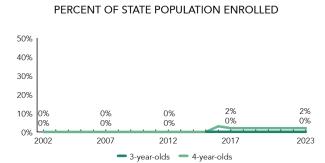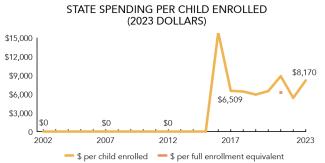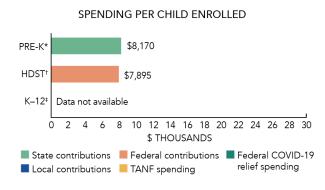
State of Preschool
Access Rankings
Resource Rankings
Total Benchmarks Met
Overview

During the 2022-2023 school year, Guam preschool enrolled 57 children, the same as in 2021-2022. State spending totaled $465,712, an increase of $159,021 (52%), adjusted for inflation since last year. State spending per child equaled $8,170 in 2022-2023, up $2,790 from 2021-2022, adjusted for inflation. Guam met 6 of 10 quality standards benchmarks.
What's New

Guam maintained public preschool enrollment in 2022-2023, while significantly increasing funding for public preschool. Guam continued working on activities funded under a $2.8 million federal Preschool Development Grant Birth through Five (PDG B–5) renewal grant. Funds are being used to support island-wide systemic improvements, parent engagement activities, and school readiness activities.
Background
The Guam Department of Education’s publicly funded Pilot Prekindergarten Program is available in all four regions of the territory’s single school district. Each region has one Prekindergarten Program classroom located within a public school. All age-eligible children may enroll in the program, which has no income limit for eligibility. Guam’s Prekindergarten Program operates six hours a day, five days a week, following the school year or academic calendar, and providing 1,080 hours of services per year. Both breakfast and lunch are served to children attending the program.
The program’s maximum class size is 18 children, with a teacher-to-student ratio of 1 to 9. Lead teachers are required to have an associate degree with early childhood education specialization and either pre-K or pre-K to 2nd grade certification. Lead teachers also are required to participate in 30 clock hours of in-service professional development annually. Assistant teachers are required to hold a high school diploma, but are not required to participate in any professional development.
Guam Department of Education Prekindergarten Program
Access
Resources
| Total state pre-K spending | $465,712 |
| Local match required? | No |
| State Head Start spending | $829,376 |
| State spending per child enrolled | $8,170 |
| All reported spending per child enrolled* | $8,170 |

*Pre-K programs may receive additional funds from federal or local sources that are not included in this figure. †Head Start per-child spending includes funding only for 3- and 4-year-olds. ‡K–12 expenditures include capital spending as well as current operating expenditures.
Guam Quality Standards Checklist
| Policy | Requirement | Benchmark | Meets Benchmark? |
|---|---|---|---|
For more information about the benchmarks, see the Executive Summary and the Roadmap to State pages. | 6benchmarks met | ||
| Early Learning & Development Standards Benchmark | Comprehensive, aligned, supported, culturally sensitive | Comprehensive, aligned, supported, culturally sensitive | |
| Curriculum Supports Benchmark | Approval process & supports | Approval process & supports | |
| Teacher Degree Benchmark | AA | BA | |
| Teacher Specialized Training Benchmark | ECE | Specializing in pre-K | |
| Assistant Teacher Degree Benchmark | HSD | CDA or equivalent | |
| Staff Professional Development Benchmark | 30 hours/year (teachers only); PD plans (teachers only); Coaching | For teachers & assistants: At least 15 hours/year; individual PD plans; coaching | |
| Maximum Class Size Benchmark | 18 (4-year-olds) | 20 or lower | |
| Staff to Child Ratio Benchmark | 1:9 (4-year-olds) | 1:10 or better | |
| Screening & Referral Benchmark | Vision, hearing, health & more | Vision, hearing & health screenings; & referral | |
| Continuous Quality Improvement System Benchmark | Site visits | Structured classroom observations; data used for program improvement | |
